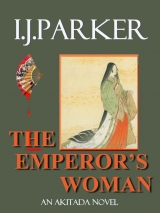
Текст книги "The Emperor's Woman"
Автор книги: Ingrid J. Parker
Жанр:
Исторические детективы
сообщить о нарушении
Текущая страница: 17 (всего у книги 18 страниц)
Masaie had listened with his head lowered. He sat very still.
In the silence, the opening of the door sounded like a thunderclap. Both men started.
Masanaga closed the door behind him and walked toward them. His face was flushed, hi eyes bloodshot, and beads of perspiration glistened on his face. He wore his sword, and his right hand gripped it. His eyes fixed on Akitada. In a shaking voice, he said, “It’s a story you’ve made up. Another lie.” His voice broke, then rose. “It’s nothing but lies. I warned you!” The hand on the sword shook convulsively.
Akitada said calmly, “It’s no lie. Yes, you tried to warn me away and then attempted to kill me when I got too close to the truth.”
In the silence, only Masanaga’s heavy breathing could be heard.
Then Masaie staggered to his feet and took a step toward his son. “We’ll speak later. Get out now,” he said, his voice hard and final.
Masanaga hesitated a moment, then turned and left.
Akitada also got up, gritting his teeth. His body still resented sudden moves. He said, “I brought your daughter’s diary so you should read what your ambition caused.” Taking the journal from his sleeve, he extended it to Masaie.
For a moment, he thought the big man would dash it from his fingers, but then Masaie took it with a trembling hand. He opened it, and tears began to well up in his eyes.
“I’ll leave you now, my Lord,” said Akitada.
There was no answer, and he walked out.
He was half afraid that Masanaga would lie in wait for him, but the anteroom was empty, and Tora waited at the outer door.
When they were back on the street, Tora said, “What happened? I saw the son go in and almost followed.”
“Not much. I returned Lady Masako’s journal to her father.”
“Weren’t you supposed to give it to her companion?”
“A grieving father has a greater right.”
“Even if he killed her?”
“He didn’t kill her, Tora. I brought him more terrible news.”
“What? I don’t understand anything. I thought you meant to accuse Lord Masaie of murdering his daughter.”
“I did think at one time he was guilty, but there was someone else who had a stronger motive and fit the image of a killer much better.”
Tora kicked at a rock on the street. “I’m a fool. I’ll never learn this business.”
“You’re not a fool.”
They walked in silence, Tora kicking more rocks from time to time. Suddenly he stopped. Akitada turned and saw a curious expression cross his face. “The cook,” Tora said. “She as much as told me.” He hit his forehead with his palm. “She didn’t like him either. She said he was bad.”
Akitada watched him. “Well?”
“The brother?”
Akitada nodded. “Yes. Only three men could have known where she had gone, the prince, her father, and her brother. And whatever his character, the prince isn’t the type to commit such a violent act. We’ll know soon enough. I think Maseie already knew or suspected as much, and this time he will not forgive Masanaga.”
For a moment Tora was silent. Then he said, “The cook did say the boy was always resentful because the father preferred his daughter. But it all feels so unfinished.”
“Sometimes it’s better to stand back and allow events to correct themselves.”
Loose Threads
Saburo met them when they returned. He bowed formally to Akitada and said, “I regret to report, sir, that the man called Bashan did not come to the agreed meeting. I must assume he feared arrest and fled.”
“Thank you, Saburo. It’s as good as a confession. Are you back to stay?”
Saburo contorted his features into a smile. “Yes. And thank you and your lady.”
Akitada liked that he made no apologies and spoke with self-assurance. He returned the smile. “Good. I was wrong to dismiss you without weighing your reasons and shall try to act more fairly in the future.”
Saburo bowed again and headed off to the stable where they could hear hammering. “You aren’t taking his room, I hope?” Akitada asked Tora.
“No, of course not.”
As they watched, Trouble came out of the stable to greet Saburo. Saburo petted the dog and suddenly did a little jump and dance of joy that the dog joined in with a happy yelp.
Tora chuckled, and Akitada heaved a deep sigh of contentment.
After changing into his comfortable robe, Akitada went to report to his wife. He found her with Akiko.
His sister glared at him. “There you are, you traitor. Why didn’t you take me along to see Maseie?”
“Because it was too dangerous.”
She pouted. “Evidently it was safe enough. What happened?”
Akitada reported what he had told Maseie about Masanaga. Tamako looked subdued and shook her head, but Akiko cried, “You gave him Masako’s journal? How could you? You promised Lady Hiroko that you would return it.”
“You promised. I did no such thing. Her father has precedence. But there was another reason.”
“Nonsense. He treated his daughter abominably.”
“You’re right, and I thought it important to have him ponder his actions. For all his reprehensible behavior, Maseie really loved his daughter. He still loves her. In time he’ll come to understand his own role in her death.”
Akiko snapped, “I doubt it. And what about the detestable Masanaga? You’ll just let him escape?”
“Detestable, yes. But because of the delicacy of the situation, which involves His Majesty, he cannot be arrested and tried. I think his father had already realized what Masanaga did. We must wait and see what action he will take.”
Tamako asked, “Will you inform Prince Atsuhira?”
Akitada sighed. “I suppose I must. I no longer like him very much. He is as much to blame as Masaie and his son.”
Akiko’s eyes flashed. “Men! All of them. Women will always be at their mercy. It will always be this way.”
Lady Kishi had said something very similar. At the time she had astonished Akitada because she was one of the most powerful women in the country. He did not argue against his sister’s point. Not only Lady Masako’s fate, but also Genba’s story had made him very aware of the injustices suffered by women.
Tamako saw his face and said, “Not all men are like that. Neither your husband nor mine nor your sister’s would treat their wives or daughters badly.”
Akiko sniffed. “I for one shall always be on my guard.” She glowered at Akitada.
He said humbly, “I’ll try to be a better brother, Akiko,” and smiled at her.
“Well,” she said mollified, “I hope that means you’ll consult me on future cases.”
Akitada and Tamako laughed.
The following morning, Akitada emerged from the house on his way to the ministry. Another hot bath had eased his remaining aches and pains, and he felt quite well again.
Waiting in the courtyard were Genba and a young woman. They stood side-by-side, smiling shyly and bowed very low. Genba straightened up, but the young woman remained bowing.
“Sir,” said Genba, “I brought Ohiro to pay her respects. She promises to be faithful and work hard.”
Akitada saw she was a sturdy-looking girl and would surely be a big help in his household, but that was not why she was here. He went up to them. “Welcome, Ohiro. Please feel at home here. We think much of your husband and are happy that you’re making him happy. He’s been far too lonely all these years.”
She gave him a huge smile and bowed again. “Thank you,” she said softly. “Genba is very good to me.”
Genba blushed. “It’s the other way around, sir.”
“Have you introduced Ohiro to my wife?”
“Not yet, sir. Should I?”
So there was still some shame. Well, they couldn’t have that. “Come along,” Akitada said briskly and headed for Tamako’s pavilion.
There the introductions went very well indeed, especially when Ohiro showed immediate affection for the children.
Akitada departed for the ministry, feeling content in his world and satisfied with the way he had handled his domestic affairs.
His good mood did not last. He still had to speak to Prince Atsuhira, and that was something he did not look forward to. He left the ministry early and walked to the prince’s palace. There he demanded to see the prince with important news.
The servant returned, saying the master was seeing no one.
Anger seized Akitada. How dare Atsuhira deny him after all he had done for him in the past and more recently. He said “Thank you,” in an icy tone, then walked past the servant and into the house. He knew the way to the prince’s room and strode ahead, followed by the protesting servant. Throwing open the door to the prince’s study, Akitada walked in and slammed it behind him.
“Your man brought your message but I chose to ignore it,” he snapped. “We have some matters to discuss, and when I’m done I hope sincerely I’ll never have to trouble with you again.”
Atsuhira, who looked pale and disheveled, stared up at him from a seat near a brazier. He was leaning on an armrest and had been reading. “I have nothing to say to you,” he said.
“I have some things to say to you, so be quiet and listen.”
Atsuhira opened and closed his mouth as if he were snapping for air but came up with nothing.
“The murder of Lady Masako is solved. Her brother Masanaga found out she was leaving the palace to join you. No doubt, he realized this would mean the end to his own career, particularly since he had already made a bad name for himself. He went to speak to her at the palace, where they quarreled. Lady Masako noted this in her journal. It was her last entry. I think it was then Masanaga decided to kill you. He followed her to your villa, where they quarreled again and he struck her with one of your bo. He probably waited for you to arrive, but you were very late, and she may have regained consciousness. In any case, he panicked. He carried her to the promontory and pushed her over, hoping that her death would be taken for a suicide. Then he left.”
The prince was pale and shuddered. “Masanaga murdered his own sister?”
“Yes. According to her companion, she loved you and looked forward to raising your child. I’m curious. Why did you tell the superintendant that Lady Masako intended to end her life?”
The prince frowned. “I don’t know. I don’t remember. I wasn’t myself.”
“In her journal, she copied down a poem she had sent to you. It read, ‘I dream sweet dreams; but my sleeves are wet with tears. If I take the dark path alone, we will meet in paradise.’ By any chance, is that what you remembered when she was found?”
“Yes. I was trying to account for what she had done.”
“The poem is dated months earlier, at a time when she was distraught over her father’s anger. In other words, there never was any indication that Lady Masako intended to die that night at the villa, was there?”
“Oh.” Atsuhira wept. “No, there wasn’t. Oh, what a relief! Thank you. Thank you for telling me. I have been in agony. I blamed myself.”
Akitada said coldly, “As to that, you will know best what your responsibility was in seducing a young and inexperienced girl who was one of the emperor’s women. Your behavior is inexcusable in my eyes. I had to intercede once before when one of your careless affairs nearly precipitated another succession scandal. Your uncle, the late Bishop Sesshin, asked for my help on that occasion. I had hoped you had learned your lesson then.”
The prince dabbed at his eyes. “I see why you’re so angry at me,” he said. “But you must believe that I truly loved Masako. We couldn’t help ourselves. Our love was stronger than everything. I don’t want to be emperor, but the way my cousin treated Masako angered me. He didn’t deserve her.”
Akitada glared at him. “So you shared your feelings about His Majesty with Kosehira and involved him. I expect you to go to the regent to clear his name, apologize for your behavior, and ask his help in settling the matter of the succession once and for all. You may wish to take vows afterward. Nothing short of becoming a monk will convince people that you don’t want to be emperor.” Without waiting for a response, Akitada turned and walked out.
In the following weeks, life in the Sugawara family settled down. Saburo was once again installed as Akitada’s secretary. Genba and Ohiro moved into their new quarters in the stable, and Ohiro spent a good deal of her time in the kitchen where she attempted to teach Cook new ways to prepare foods. Cook had never been more than passable in her skills, and the household fare was uninspired. Now some very tasty dishes appeared. As a result of this interference, Cook departed in a huff to the secret joy of the members of the household. Ohiro took over her duties.
Not long after this, his friend Kosehira returned to the capital, cleared of all suspicion and eager to celebrate with his friends and supporters. However, in spite of his contentment, Akitada felt restless.
One morning, Tora voiced the reason for Akitada’s dissatisfaction. “You know, sir,” he said, “two people have died violently and nobody got punished. It doesn’t seem right.”
Akitada nodded. “You’re right. It doesn’t. Not that we had any choice in the matter. Bashan, that slippery fellow, left no proof of what he’d done, and Lady Masako’s killer could not be revealed or arrested because it would have involved court matters. But it troubles me also.”
Bashan, or Satake Narimitsu as he was born, disappeared into the northern provinces, and nothing else was heard of him. But Morinaga’s fate became known soon after this conversation. The minister, Fujiwara Kaneie, conveyed the information to Akitada one morning.
“You recall the death of one of His Majesty’s ladies last winter?” he asked.
“Yes. She died of some illness, didn’t she?”
“Yes. A bit odd that. People have been saying she lost a child. The palace, of course, won’t confirm such rumors. However, it’s not the young woman who is being talked about but her brother.”
Akitada became alert. “Minamoto Maseie’s son?”
“Yes. It’s shocking. First the man loses his daughter before she can become a consort of the emperor, and then his only son dies. A hunting accident, apparently. It happened in Sagami, right after Maseie and Masanaga reached their home. Mind you, the young man had a poor reputation while he was here. The regent dismissed him from his post in the guard.” The minister shook his head. “Maseie’s karma must be very bad.”
Akitada nodded. He wondered how Maseie had managed his son’s death, but there would have been many opportunities. The father had avenged the daughter’s murder, but at what cost to himself?
For a moment, he lost himself in imagining the man’s pain and despair, uncomfortable with his own role in bringing it about. Yes, karma explained it very well. Maseie, as well as his children, must have earned these tragedies by having committed evil deeds in their past lives. One must accept one’s fate and strive to earn a better future.
Historical Note
The time of this novel is 1028 in the Heian period and predates the centuries of shoguns and samurai warriors. Though there certainly were wars and warriors, life was more peaceful and orderly than in later centuries. An emperor and a central government controlled the people from the capital city of Heian-Kyo (later Kyoto). Additional provincial administrations along with a well-organized transport system made for a mostly stable government. Most institutions and customs followed those in T’ang China, but the Japanese had long since broken off relations with that nation, and the meritocracy of the Chinese government had made place for promotion by rank and influence.
Control of the central government eventually passed into the hands of a single large family, the Fujiwara. Through marriage politics, senior Fujiwara officials held all the highest positions and controlled the emperor. They became the fathers-in-law, uncles, grandfathers, and cousins of ruling emperors. By encouraging the early abdication of emperors in order to replace them with more easily controlled children, they protected their power. Perhaps the most powerful man of the time was Fujiwara Michinaga, who ruled for many years, either as chancellor or as regent, being the father or grandfather of chancellors, empresses, and emperors. By 1028, he had died, but his power had passed to four of his sons
We know a great deal about life in the imperial palace. The court ladies of the time were avid writers and produced novels, diaries, and an abundance of poetry depicting their lives and those of the courtiers. Lady Murasaki’s Genji is the most important of these works. It describes the events in the life of an imperial prince who was also a famous lover. Then there are the diaries which deal with real events and real people at court and around the person of the emperor. Among these are Sei Shonagon’s sharp-tongued commentary, Lady Murasaki’s account of her service as lady-in-waiting to one of the young empresses, diaries of women like Izumi Shikibu, the Kagero Nikki, and the Sarashina Nikki. We learn from these not only about court observances, but also about the manners and mores practiced in this setting. Love affairs were common and fraught with grief for many of the women. Access to pretty young girls serving the emperor was apparently easy, and courtships/and affairs were pursued with alacrity by the gentlemen who served at court. The best and most accessible scholarly account of life at court may be found in The World of the Shining Prince by Ivan Morris.
With the administrative power almost exclusively in the hands of the Fujiwara family, whose daughters were usually empresses and consorts, emperors tried to rule briefly before resigning under pressure from their in-laws in favor of sons who were minor children and ascended the throne under the guardianship of a Fujiwara grandfather. Political uncertainties about the imperial succession could ensue when there were several claimants to the throne. Invariably, the choice of a crown prince was in the hands of his Fujiwara relatives but affected all the lives and careers of officials. Hence, in this novel, the seriousness of the alleged plot by Prince Atsuhira and the efforts of Minamoto Maseie to introduce his daughter Masako into the emperor’s bed.
Marriages for the upper classes were polygamous, that is, a husband could have several wives in addition to casual lovers. The wives differed in status, depending on their backgrounds and the birth of sons. A marriage could be dissolved on the husband’s word. But women of the eleventh century could own property. That fact and the influence of their fathers protected upper class women to some extent. Lady Kishi in the novel has considerable power even though her husband prefers others over her.
A commoner had rarely more than one wife, and she was usually a hardworking partner in the business or on the land. Poverty put women at great risk as families struggled to feed all their children. The Confucian ideals of obeying and honoring one’s parents forced them to work in near-slavery or to sell their bodies to support them.
The Willow Quarter mentioned in some Akitada novels has no solid historical sources. This is probably largely due to the fact that contemporary accounts were written by the upper classes who rarely referred to prostitution. But noblemen do speak of taking pleasure cruises to the brothel towns of the Yodo River, and one of the diaries mentions how the writer met a group of female entertainers while on the road to the capital. Female entertainers were not only talented performers of dance and song, but they were also available for sexual services. It stands to reason that the capital would have had prostitutes, and that they would have occupied a specific part of the city. For an account of the sex trade in early Japan, see Janet Goodwin’s Selling Songs and Smiles.
The references to bathhouses, blind masseurs, and various treatments of wounds and diseases rely to some extent on later sources, though an early treatise on medicine (Yasuyori Tamba’s Ishimpo) mentions acupuncture and moxa treatments and all sorts of odd herbal concoctions. In general, medical knowledge was rather primitive.
By the end of the Heian period, a guild or association system developed for trades. This included some of the outcast (eta) such as beggars and certain occupations thought to be unclean in terms of Shinto taboos (those who touch dead people and animals). Such brotherhoods usually existed under the protection of a temple and conducted themselves by their own rules.
The references to shinobi, the shadow warriors and forerunners of the ninja, can also be supported by contemporary accounts of the use of specially trained spies in times of war. Saburo learned his skills from monks, but Bashan trained with the northern army.
Law enforcement at this time was in the hands of a police force (kebiishi) and city wardens. Wardens supervised each ward of the capital and kept the peace in their own area. The imperial police investigated serious crimes, arrested criminals, and jailed them in two city jails. They worked closely with judges who heard the evidence and pronounced sentence. Flogging was a part of the gathering of evidence. Occasionally, mediums were called in to speak for the victim. Punishment consisted of incarceration or exile to labor camps. Executions were rare because of Buddhist laws against taking lives. Periodically, emperors would grant freedom to all prisoners to appease the gods in times of disasters and epidemics. Ranking police officers were trained warriors, and the top administrators, like Superintendent Kobe, belonged to the aristocracy.








